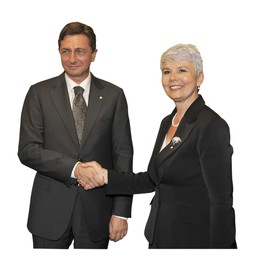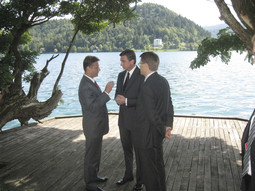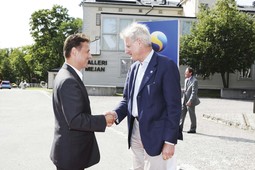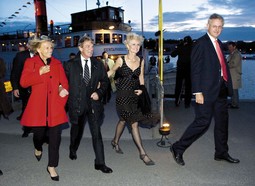Prime Minister Jadranka Kosor with her Slovenian colleague Pahor in Gdansk
Nacional has finally learned the details of a matter kept in the strictest secrecy - an agreement between Croatia and Slovenia that should end a many year border dispute - from a European Union source in Brussels. The plan has three points.
First, that Croatia withdraws contentious documents that Slovenia feels prejudice the Slovenian-Croatian border in Zagreb's negotiations with Brussels. Second, that the border dispute will be resolved by a five-member panel of international law experts, with negotiations ongoing as to who would be on the panel of experts. And third, that Slovenia abandons its blockade of the Croatian negotiations as soon as a final agreement is achieved on the first two points.
Nacional has checked these revelations with the Slovenian and Croatian foreign ministries. And while the two governments are keeping everything concerning the negotiations in the strictest secrecy, as they agreed, they have confirmed that this is the gist of the bilateral agreement that will open the way to Croatian accession to the European Union. First of all, Croatia will withdraw the contentious provisions that Slovenia is citing as the reason it has blocked 14 negotiation chapters, nine of which are ready to be opened, and five of which can be closed. Both legally and logically, this Slovenian demand is not in good form, but Slovenian Prime Minister Borut Pahor's government is unwilling to back down. Using the excuse that Croatian documents prejudice the border, Pahor's administration blocked the negotiations back in December, during the French presidency of the EU. The French tried to hammer out a compromise, but did not succeed, nor did the Czech Republic, and so far the Swedes too have failed in this. And even when it concerns irrelevant articles of law that mention some small border crossing, Slovenia is unwilling to back down, while the Croatia side agreed to a compromise. From the Croatian standpoint it is more important that the negotiations continue and that Croatia becomes a member of the EU, and these few hamlets and border crossings will be completely unimportant in the future anyways.
The second aspect of the plan being prepared by leading state officials in Croatia and Slovenia relates to the ad hoc arbitration. Almost all Croatian politicians have for years insisted that the border dispute be resolved by one of the international courts in The Hague or Hamburg, which the Slovenians have opposed, proposing mediation, which would, along with purely legal arguments, also include political, historical and cultural aspects.
The matter is clear - from the legal aspect Slovenia could in no way achieve its demands related to the Bay of Piran, and that is why they have insisted on mediation or ad hoc arbitration. The current situation is such that the Croatian side is willing to back down from its firm position that the dispute should be resolved only in The Hague or in Hamburg, and is close to accepting the idea of a five-member judicial panel made up of renowned international law judges. Contrary to this, the Slovenes want the judges to be appointed by the European Commission, and are also of the opinion that they need not be experts that have already dealt with border disputes between neighbouring countries. In any event, one member would be proposed by Croatia, one by Slovenia, and three by international institutions.THE BLED MEETING Gordan Jandrokovic with Borut Pahor and Samuel Zbogar
A great deal of progress has also been achieved in the third part of the plan, as both countries are willing to abandon in part their current positions in addressing the conflict in the Bay of Piran - Croatia from insisting on only international law, and Slovenia on the principle of righteousness. To date, both Zagreb and Ljubljana have cited Article 15 of the 1982 Convention on the Law of the Sea, with either side pushing that part of the legal provisions that favoured its position. For Croatia this is the introduction, in which it states that no country is authorised to expand its jurisdiction over the line that passes through the middle of a bay, while Slovenia has cited the second half of the article, which states that the provision is not applied in cases where border demarcation has to be carried out in a different way for historical or other reasons. Based on the current negotiations between representatives of the two governments, it appears that there is a possibility to achieve a compromise on the issue, and intensive contacts between the Croatian and Slovenian Prime Ministers are ongoing. A high-ranking diplomatic source at the Croatian foreign ministry has confirmed for Nacional that negotiations are underway on a possible new meeting between Jadranka Kosor and Borut Pahor, which should be held this month. If the representatives of the two governments and their aids succeed over the coming two to three weeks in resolving the five percent of unresolved issues of which Jadranka Kosor spoke recently, the meeting will be held, and that would be an important step towards unblocking the EU negotiations. In that case, the final phase would be the Accession Conference on 16 October, and in an optimistic scenario as many as nine negotiation chapters could be opened, i.e. closed on that day. But for now it all depends on the success of the three-point plan.
As recently as early this June the Ivo Sanader Government was considering changing its strategy, i.e. accepting a good portion of the Slovenian demands. At a meeting of the heads of European people's parties in Brussels, Sanader put forward two new proposals to unblock Croatia's accession negotiations. The first proposal was that the governments and parliaments of Croatia and Slovenia adopt a joint statement that no decisions or documents could prejudice the border. The second option included a plan in which the legal departments of the European Commission and EU Council would be asked to submit a joint opinion on whether it was even legally possible for Croatia, or any other country, to prejudice the border in accession negotiations. If these two legal departments confirmed that it was possible, Croatia would be ready to withdraw the documents in question.
DIPLOMATIC ACTIVITY The head of the Croatian diplomacy with his Swedish colleague Carl Bildt last week in Stockholm
By way of compromise, Sanader had emphasised that the acceptance of one of these proposals had to assume the immediate unblocking of the negotiations. The Slovenes did not react to these proposals, which was followed soon afterwards by a change at the top of Croatian Government. In any event, the negotiations picked up steam after Sanader's departure. This precisely has been underlined by Samuel Zbogar, and the behaviour of Gordan Jandrokovic has also been significant, who did not comment this observation made by the head of the Slovenian diplomacy. A close Jandrokovic aid claims that this is not at all by chance, and that the Croatian Foreign Minister, figuratively speaking, is "breathing easier" since Sanader's abdication and since Bianca Matkovic left the ministry.
And one should not cast the role of Jadranka Kosor in an abstract light, as she also can take much of the credit for improving relations with Slovenia. When she came into the post of Prime Minister, she was criticised as lacking experience in foreign policy, but even as early as at July's meeting with Pahor it could be sensed that things were moving from a dead stop, and in the meantime several secret meetings of the HDZ leadership have upheld her foreign policy. At least part of the credit for that goes to Prime Minister Kosor, regardless of the big role the European Union and the United States have had in softening the Slovene position. Slovenia has for months now had no support within the EU.
At issue here is not just frustration with the policy being led by Ljubljana, which persists in its blockade over a few kilometres of border that in day to day life present practically no problem at all, but also the fact that the issue has a regional context. South Eastern Europe is far from stability, and there is the latent danger of a worsening situation in Bosnia & Herzegovina and Kosovo. Croatia has become a test of sorts for the other countries in the region and an indicator that by accepting European standards and democratic values, one can become a part of the EU. The Slovenian blockade is deterring European policies, which has resulted in ever-stronger diplomatic pressure on the government led by Borut Pahor. Over the past few months the USA, which also wants a stable Balkan region, has also gotten involved. The Americans were effective in their reaction when Slovenia was forced to stop obstructing Croatia's accession to NATO membership, and are now through diplomatic channels also lobbying to see the negotiations between Zagreb and Brussels continue. During his official visit to Washington at the start of this summer, Samuel Zbogar heard the explicit US position opposing the blockade. And Slovenia has of late also had significant problems with Italy and Austria, who are, unlike Croatia, influential members of the European Union. Its dispute with Vienna emerged as a result of the Slovenia claim that Ljubljana was a successor to the Austrian State Convention of 1955, on the basis of which the Second Austrian Republic was created. The disagreement over the ADP is so deep that a recent meeting between Foreign Ministers Samuel Zbogar and Michael Spindelegger ended with statements from both to the effect that they "agree only to disagree." Slovenia recently also opened a diplomatic dispute with Italy over an energy facility being built in the environs of Trieste. Pahor's administration claims that Italy is threatening the ecological balance in the Bay of Trieste with the project, and the negative reaction in Rome to the Slovene objections are so intense that Silvio Berlusconi cancelled a scheduled official visit to Ljubljana. When these cases are numbered with the long-standing dispute with Croatia, it means that the only neighbour with whom the Slovenes have not had a falling out with so far is Hungary.THE MINISTERS IN STOCKHOLM The head of the French diplomacy, Bernard Couchner, an his Swedish colleague Carl Bildt with their wives Christine Ockrent and Anna Maria Corazzo Bildt
The Swedish press writes that a recent meeting of EU foreign ministers also saw Swedish Prime Minister Fredrik Reinfeldt accuse Slovenia of having "taken EU enlargement as hostage with its own conflicts".
Nicolas Sarkozy's reaction in late 2008 was along these lines, and there is no longer any sympathy in other European countries for the Slovenia blockade. Martti Ahtisaari, the Nobel Prize winner who was for a time a candidate to mediate in the Slovenian-Croatian dispute, has also expressed his regret over the policy being led by Slovenia. It is for all of these reasons that there are good odds that the latest Croatian-Slovene plan to resolve the contentious border issues will succeed. There is no doubt that this is a compromise in which Ljubljana and Zagreb are backing down from some of their positions, but in a way that no one winds up the loser. That means that the Slovenians will get very extensive rights in the Bay of Piran, and that Croatia will not relinquish its territory and will continue on its path to European Union membership. The tale is not yet told, but it appears that there is a good chance of a positive resolution.
A PLAN TO RESOLVE the border dispute
1. Croatia withdraws the contentious documentation Slovenia feels prejudice the Slovenian-Croatian border in the negotiations ongoing between Zagreb and Brussels.
2. The border dispute is resolved by a five-member panel of international law experts. Negotiations are ongoing as to who would be on the panel, with proposals that Slovenia and Croatia each appoint one, and the other three be appointed by international institutions.
3. Slovenia abandons its blockade of the Croatian negotiations with the EU as soon as an agreement is reached on the first two points.








